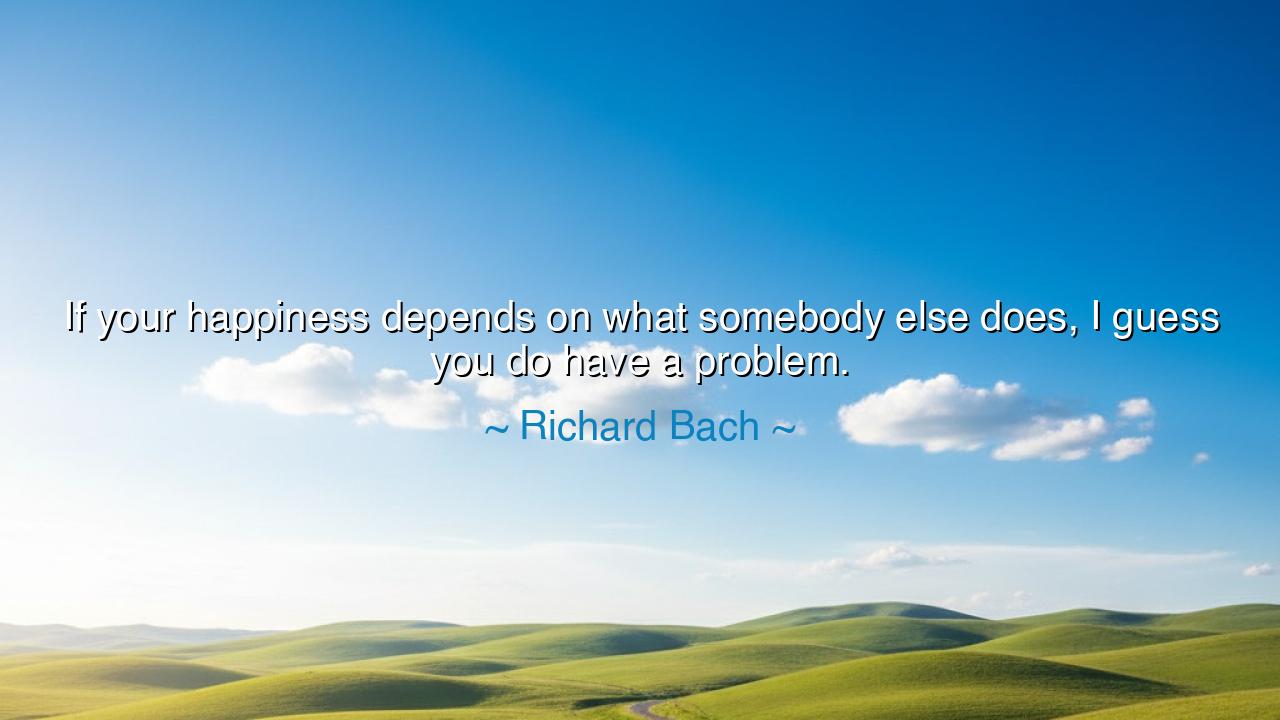
If your happiness depends on what somebody else does, I guess you






"If your happiness depends on what somebody else does, I guess you do have a problem." So spoke Richard Bach, the modern mystic and author of Jonathan Livingston Seagull, whose words soar beyond mere advice and into the heart of timeless truth. In this simple but piercing declaration lies the wisdom of ages—that happiness, to be pure and enduring, must rise from within the soul, not from the shifting winds of others’ actions. For the man who ties his peace to another’s behavior has built his house upon the sand, and when the tide of disappointment comes, it will wash away his joy.
From the dawn of civilization, the sages have warned against this bondage of the heart. The Stoics of old, such as Epictetus, taught that freedom lies not in controlling events or people, but in mastering one’s own mind. “You have power over your mind—not outside events,” he said. “Realize this, and you will find strength.” Likewise, Bach reminds us that dependence on others for happiness is the root of unrest. To entrust one’s spirit to another’s choices is to surrender one’s sovereignty. True freedom begins when one reclaims the authority to create peace within, regardless of what others say or do.
Consider the story of Marcus Aurelius, the philosopher-emperor. Surrounded by betrayal, deceit, and the heavy burden of empire, he did not let his serenity depend upon the loyalty of those around him. When friends failed and enemies multiplied, he wrote in his journal, “Be like the rocky promontory against which the waves continually break, but it stands firm and tames the fury of the water around it.” His happiness, born of inner strength, was beyond the reach of any man. Thus, Marcus was emperor not only of Rome but of his own soul.
Yet, how many in our world forget this lesson? They say, “I would be happy if only they loved me,” or “if only they treated me kindly,” or “if only they approved.” Such words are chains forged by one’s own longing. To depend upon the moods and actions of others is to place one’s heart in their keeping, and few are careful with such treasures. Happiness that relies upon another’s will is fragile, a flame trembling before every breeze. But the happiness that springs from self-understanding, gratitude, and inner peace burns with a light that no storm can extinguish.
To live as Bach counsels is to practice emotional independence, not through cold detachment, but through sacred balance. Love others deeply, but do not make them the source of your worth. Care for their choices, but do not let their failures unmake your peace. In truth, the greatest love is not clinging but free—where two souls stand whole and strong, sharing joy but not feeding upon each other’s strength. This is not selfishness, but wisdom: the recognition that no one can give you what you must first give yourself.
Even the saints and poets understood this. The Buddha said, “Peace comes from within. Do not seek it without.” Christ spoke of the kingdom of heaven not as a distant place, but as something within you. And the poet Rumi wrote, “Do not seek love outside yourself; you are both the seeker and the sought.” The echoes of Richard Bach’s words resound through these timeless teachings: that the wellspring of happiness is the human spirit itself, unshaken by the behavior of others, rooted in truth and self-knowledge.
So, my children of the future, learn this: you cannot control the hearts of others, but you can rule your own. Do not give to anyone the power to disturb your peace. When others act with cruelty, choose understanding. When they fail to see you, choose patience. When they turn away, choose dignity. For happiness that depends upon others is fleeting, but happiness born of self-mastery is eternal. Be as the sun—it shines not because the world praises it, but because it is its nature to shine.
And thus, Richard Bach’s teaching becomes our guide: cultivate the garden of your own heart. Tend your thoughts, your actions, and your peace as a sacred flame. Let others walk their paths, as you walk yours. For in the end, happiness that comes from within is the only kind that endures—the kind that cannot be stolen, shaken, or destroyed, but only deepened, as your spirit learns to stand in its own radiant light.






AAdministratorAdministrator
Welcome, honored guests. Please leave a comment, we will respond soon